- Home
- Jack Canfield
Chicken Soup for the Nurse's Soul Page 7
Chicken Soup for the Nurse's Soul Read online
Page 7
Those beautiful lullabies were the last sounds he would ever hear.
This little boy passed into the next life surrounded by love—the love that he so desperately needed and deserved in this life. There is a Bible passage that says, “Whatsoever you do to the least of my brothers, you do unto me.” By her actions, this nurse clearly demonstrated the powerful significance of these words.
A single act of love, performed by one special nurse who opened her heart and soul, made a big difference to this precious little angel.
Laura Hayes Lagana
My Promise
When love and skill work together, expect a masterpiece.
John Ruskin
I was working as a house supervisor in a small, rural hospital on a bitter cold Midwestern winter in 1992. I wasn’t even supposed to be working the evening shift, but had agreed to swap with a colleague who needed the night off.
Among my many duties was to assist in the emergency room if our lone ER nurse needed help. My pager echoed down the hallway that quiet evening, and I picked up the nearest house phone.
“I need your help now,” Nancy said urgently. “We have an ambulance out on a little boy. Not many details, but it doesn’t sound good. He was found outside in a snow bank, and the first responders have started CPR.”
My heart sank. It was thirty degrees below zero with windchill. The child didn’t have a chance.
I immediately thought of my own little three-year-old boy. It seemed he was always on my mind. He’d been so distant for such a young child, disappearing into his room for hours to read his books. If I tried to sit down and read with him, he threw the book and left the room. I was his mother and loved him more than anything in this world, but he seemed to prefer his silence to my songs. He preferred aloneness to my love.
My attention snapped back as I entered the emergency room. The ambulance was just pulling up, and when the gurney rolled into the ER it was met with dead silence. CPR was in progress. The blond boy lay lifeless and pale, his blue eyes staring vacantly, pupils fixed and dilated. His perfect little hands were frozen so solid, we could not unclench his fists. Because of the circumstances, we were obligated to continue CPR until his core body temperature was raised. I had heard of cases of hypothermia where children were revived, but no one in the room seemed to hold any hope of bringing back this little boy.
The next hour passed quickly as cut-down IVs, chest tubes, peritoneal lavage and urinary catheters all infused warmed saline into his still, frozen body. I stood silently over him, tears running down my cheeks, as I prayed silently for him and his family. I could not even begin to understand the pain his parents were experiencing, and all I could do was bring them periodic reports that we were doing all we could.
He was the same age as my little boy, with the same beautiful blue eyes and blond hair. I thought of how much I loved my son and tried to remember the last time I told him I loved him so. What if he died tonight? Would he die knowing how much I loved him? I realized, watching a group of doctors and nurses desperately trying to do the impossible, that I hadn’t even hugged him before leaving for work. And I deeply regretted that now.
Then a miracle occurred. We gave no medicine; we gave no electrical shocks to the heart. All we did was warm him up. His heart began to beat. Slowly at first and then more steadily. Ten beats a minute. Then twenty. We thought about adrenaline, but the physician decided against it. Within two minutes, we had a pulse. In ten minutes, his color turned a beautiful shade of pink and his pupils became reactive.
Stunned silence permeated the room, and I was in awe knowing I had received a very special invitation to witness a miracle.
Over the next few months the child made a full recovery. Other than frostbite to his toes, he was miraculously unharmed.
I made a promise to myself that night. A promise to never again let a day go by that I didn’t hug my son and tell him that I loved him. It no longer mattered if he returned my love or if he continued to push me away. He would never leave this Earth without knowing how much I loved him.
In the months and years that followed, I kept my promise. My son was diagnosed with autism shortly after I witnessed this miracle. He has done very well and is today a very happy, loving little boy. Thanks to my special invitation to witness the miracle that taught me unconditional love.
Linda C. Bird
Billy’s Good-Bye Gift
You will find as you look back upon your life that the moments when you have truly lived are the moments when you have done things in the spirit of love.
Henry Drummond
When I moved from Ohio to Arkansas, I considered it a blessing. After living up north all of my life, I was ready for a change. My house had burned down, my husband left me after fourteen years, and my very existence had disappeared into a black hole. Moving to Arkansas, nearer my ailing mother, seemed to be a great idea. I had nothing to lose. However, I was not prepared for the gifts I was about to receive.
I was very grateful to land a job right away at a Christian hospital, working on surgery floors. Then one day I was sent up to oncology. I protested to deaf ears. You will work where you are needed, they told me. I thought it was dreadful. I could feel death everywhere, and my heart felt so heavy. Day after day, I was sent to the cancer floor.
To my amazement, after awhile I began to “need” to work on that floor. One day, I stood among my “babies” and realized that God had sent me here. This was my home. My patients were no longer room numbers—they had faces and names. I knew what they liked to eat, how many children they had, at what job they had spent most of their life working and how they felt about their cancer.
As with many nurses, I became close to these very special patients. I loved each and every one of them. At times, it was difficult keeping my emotions in check.
One day, a patient named Billy came to the floor. He was a large man with bone cancer and a great sense of humor. Though he was in great pain, he rarely complained. His loving wife watched over him with the greatest love one can imagine and made certain he received the best care. We all laughed and cried together, and shared family stories and jokes. They became part of our hospital family.
After coming in for chemo treatments and going back home several times, Billy’s energy was spent. The last time he was admitted, he looked beaten. So did his wife. He was suffering so much that it was hard for all of us to care for him—we knew there was nothing much we could do. He was now terminal, and his pain so intense that no amount of medicine helped. I think every nurse cried for Billy and his family.
It was nearing Easter, and Billy had so many visitors it was hard for his wife to have any time alone with him. I felt so sorry for her. But she kept smiling.
One night, near the end of my shift, I made my last trip down the hallway and peeked in on Billy. I opened the door to his room very slowly so I wouldn’t wake him. The light from the hall shone into the room and lit it up like moonlight. I looked towards the bed and a little gasp escaped from my mouth. There was Billy, lying on his back, the position I knew was most painful for him. Next to him lay his wife, nestled in the pit of his arm, all curled up like a baby deer next to its mother. She was sleeping so soundly, I could hear little whistles coming from her mouth. I stood there, like an intruder. My feet would not move. As I tried to leave, Billy opened his eyes. He smiled a crooked smile and winked at me as if to say, “It’s okay.”
I closed the door, walked up the now empty hallway, and went to the chapel. I cried a few minutes then thanked God for blessing me with this very special moment.
Billy died soon after that night, but not before he gave me new eyes and a special good-bye gift.
Susan Spence
3
DEFINING
MOMENTS
Life becomes harder for us when we live for others, but it also becomes richer and happier.
Albert Schweitzer
All Our Hearts Have to Offer
Death and Love are the two wings that
bear the good man to heaven.
Michelangelo
No classroom course I ever took prepared me for one of the most difficult lessons I learned during my nursing career. Feeling fully confident and armed with cuttingedge knowledge of critical care, I embarked into the incredibly exciting field of flight nursing. Life on the helicopter was full of ups and downs—literally. I was constantly placed in a pivotal position impacting the way families dealt with instantaneous life-changing events.
During my first pregnancy, I worked with a pediatric resident who predicted my outlook on my patients would change dramatically when I gave birth to my child. I’d always felt I had compassion for my patients and their families, but her words proved prophetic and have echoed in my mind and heart many times since that day in 1984.
I was called to a small emergency room to airlift a five-month-old who had stopped breathing. I was immediately confronted by a hysterical mother, distraught over the possibility that she had somehow caused this catastrophe. She desperately looked to me for reassurance that all would be well. Based on the lab values, X rays and the child’s condition, I could not promise that. In those days, our helicopters were much too small to accommodate a parent, and this child was so critically ill and in need of advanced care, that it became a “scoop and run” situation.
In my haste, I failed to allow a momentary interaction between mother and child. I cuddled the little girl in my arms, and we flew with all the speed the machine could muster to the awaiting pediatric critical-care facility. Her condition proved too critical, and resuscitation attempts were futile. As I realized this sweet mother would never again have the chance to hold her live, breathing, warm baby, a haunting feeling pervaded my soul. A feeling I would not soon forget.
Since that day, and following the arrival of my four beautiful, healthy children, I have been faced with countless opportunities to extend healing to family members. My outlook on my patients has, in fact, changed dramatically. While I still carry charts, calculations, medications, equipment and skill, I have learned there truly is no replacement for the human touch. Since most of the patients I transport are extremely critical, the window of opportunity for technology passes for many of them. Yet families still count on me and countless other flight programs around the world to deliver one last miracle. Thankfully, a God-given feeling of compassion encircles me when I realize the time has come to help heal the nurturers. Now I allow human contact to begin the healing process for family members.
I spent time with a distraught father several days after his daughter was killed in an accident. He came to pick up her purse, left in the back of the helicopter. He begged to know of her last words, to know if she suffered, to know if there was anything he could have done to change the tragic outcome. Tears flowed freely as I reassured him she had been in good hands and given every opportunity available to her. We parted having given each other a small measure of comfort.
I arrived to pick up a three-year-old who had been found submerged in the family pool. Fourteen family members cried out, “Thank God, they’re here to save our baby!” A review of his condition soon revealed his little body and brain had been deprived of life-sustaining oxygen for too long a period. His six-year-old sister stepped forward with his stuffed animal; he needed it with him at all times. Kisses were given, touching encouraged, cautions for them to drive safely issued, and we flew to the receiving facility, teddy bear in tow. Gratefully, the little boy survived long enough for the family to arrive. Seeing it was hopeless, the father begged to hold him one last time “while he still feels alive and warm.” We disconnected all technology and wrapped his son snugly in a blanket for his daddy to spend precious moments embracing him.
I broke all the rules when I brought family members past the yellow “Caution” tape so they could touch and whisper hasty good-byes before departing from highway accidents, certain they will never again see their loved ones alive. I violated the posted hospital visiting rules and carried small children to their mother’s side to kiss, touch, cry and lie next to mommy on the way out to the helicopter.
I’m asked by patients, en route to trauma centers, the status of their husband, wife, friend or sibling. The looks in their eyes indicate their knowledge of the inevitable, and my heart aches as I try to soften the truth.
How grateful I am for all that medicine has to offer, for living in a time when technology changes as rapidly as the second hand ticks. But I am more grateful for those opportunities when soul touches soul, when communication is perfect despite the silence, and when the only thing I have to offer family members is one last memory with their loved ones.
Sixteen years have passed since I listened to words that would shape my care of patients. I have witnessed untold tragedies, but through it all my solace has been the gift of a last touch, a last kiss, a last word, and the hope that these moments would alleviate some of the suffering. I pray that other caregivers will learn this lesson sooner than I did and extend not only all that technology has to offer, but all that our hearts have to offer, as well.
Janie K. Ford
The Touch of Kindness
No love, no friendship can cross the path of our destiny without leaving some mark on it forever.
François Mauriac
“Why do you want to be a nurse, Patricia?”
The two nursing instructors and the dean of nursing sat at their table, squarely facing me as I sat on my hard, straight-backed wooden chair facing them. “Two thousand young people have applied to our program.” The dean’s voice came from across the room, “and we will select sixty of them. Tell us why we should choose you.” She folded her hands and looked up at me from the stack of application forms.
I hesitated a moment, wondering what the other applicants sitting in this same chair had answered. What did they say that was music to the instructors’ ears? I tried hard to imagine what they wanted to hear from me.
I thought my reason for wanting to be a nurse sounded simple and silly, so I hesitated and was quiet. It seemed laughable that I should be applying to nursing school at all. During my childhood I was terrified of doctors, nurses and hospitals. I dreaded every office visit even for an annual checkup! So it was a surprise to many that I now had the desire to become that which I had formerly done my best to avoid. But an incident from my childhood was compelling me, and I drew upon that now.
When I was six years old, my parents were told I needed to be admitted to the hospital for some “tests.” They drove me to the children’s hospital across town on a cold gray Sunday afternoon. I looked up at the imposing building and then quickly hid my face in my mother’s sleeve. I tried to resist going in, but my mother and father were holding my hands and I was whisked along against my will.
We exited the elevator, and my parents led me down a long hallway. When we came to a large room that was divided into cubicles, we stopped. We were directed to one of the cubicles by a stern gray-haired nurse who pointed here and there, showing us where my suitcase should go, where my pajamas and robe should hang, where the button was to press so a nurse would come when we wanted.
My father went downstairs then, and my mother tried to make me feel at home. The gray-haired nurse soon brought a supper tray, but I couldn’t eat. Everything here was so different from what I was used to. So my mother picked at the food on my tray while she tried to entertain me. She tried to cheer me by talking about how some of the children there were very sick, and it was nice that I was only there for “tests” and would be able to come home soon.
I wondered why my mother didn’t have a suitcase with her. Wouldn’t she need some pajamas and a robe, too? After the nurse took the tray away, I learned why. My parents were not allowed to stay with me. They were going home, and I was staying there. They were leaving me, and I’d never been away from them before. As my mother slipped into her coat and prepared to leave, I began to cry.
“No, no, Mama, please don’t go, please don’t leave me!” I begged. She just smiled slightly and t
old me she’d be back tomorrow, to be a good girl and do what the nurses told me.
As I listened to her footsteps fade away, I turned over in my bed and curled up in a tight little ball, facing away from the door. I tried to think of something happy. I tried to think of songs I liked to sing. I tried to remember the faces of all my stuffed animals at home. I thought hard, but my thoughts were interrupted by another nurse who said firmly, “Time for bed.”
I sat up then, and she removed my robe and pajamas and dressed me in a hospital gown. I lay back down and curled up tighter than ever and wept. The lights were turned out then, and I lay awake in the dark.
Much later, I heard someone enter the room, where I still whimpered in my bed. “You’re not asleep yet?” a pleasant, quiet voice asked.
“I can’t sleep,” I said, trembling.
“Sit up a minute and talk to me,” the voice coaxed. I sat up then, and in the dim light I could see it was a nurse, but not one I had seen before.
“I want to go home,” I said, sobbing again. The nurse reached forward and held me as I cried. “I think I’m going to be sick,” I moaned, and my stomach began to heave.
She held a basin in front of me and wiped my face gently with a damp washcloth. She cradled me then as I calmed down, and I lay limp against her shoulder as she rocked me back and forth.
After what seemed like a very long time, she looked down at me and said, “I have some work to do now, so I can’t stay with you.” Seeing my dejected look, she added, “But maybe you could come and be with me. Let’s see.”
In the hallway there were low wooden wagons with mattresses and pillows that the nurses used to take some of the children outside for some fresh air. She brought one of these to my bedside and beckoned for me to get in. As she lifted me down to the wagon, I looked at her shiny name pin and read “Miss White.”

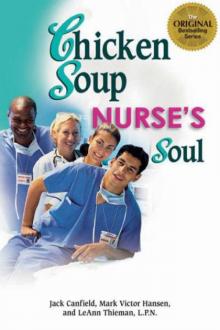 Chicken Soup for the Nurse's Soul: Second Dose
Chicken Soup for the Nurse's Soul: Second Dose Chicken Soup for the Ocean Lover's Soul
Chicken Soup for the Ocean Lover's Soul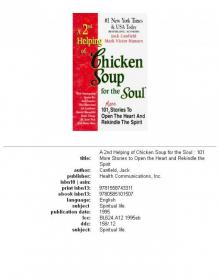 A 2nd Helping of Chicken Soup for the Soul
A 2nd Helping of Chicken Soup for the Soul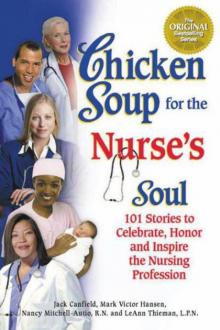 Chicken Soup for the Nurse's Soul
Chicken Soup for the Nurse's Soul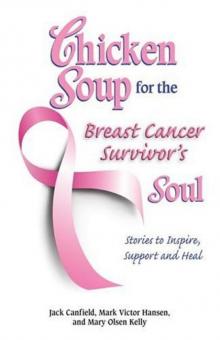 Chicken Soup for the Breast Cancer Survivor's Soul
Chicken Soup for the Breast Cancer Survivor's Soul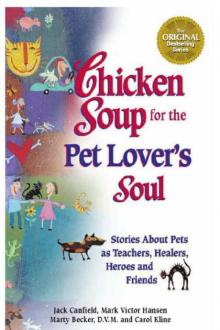 Chicken Soup for the Pet Lover's Soul
Chicken Soup for the Pet Lover's Soul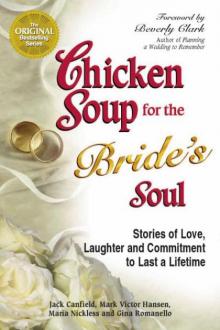 Chicken Soup for the Bride's Soul
Chicken Soup for the Bride's Soul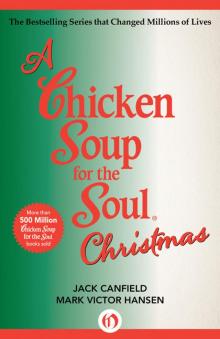 A Chicken Soup for the Soul Christmas
A Chicken Soup for the Soul Christmas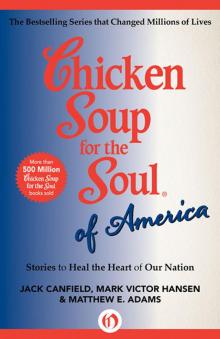 Chicken Soup for the Soul of America
Chicken Soup for the Soul of America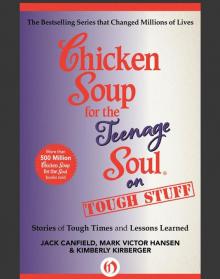 Chicken Soup for the Teenage Soul on Tough Stuff
Chicken Soup for the Teenage Soul on Tough Stuff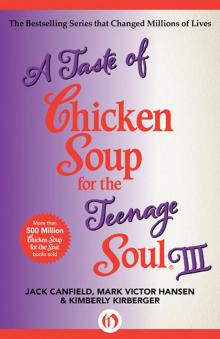 A Taste of Chicken Soup for the Teenage Soul III
A Taste of Chicken Soup for the Teenage Soul III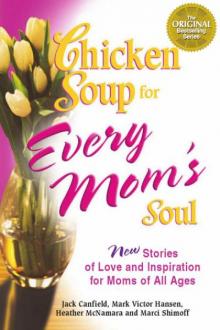 Chicken Soup for Every Mom's Soul
Chicken Soup for Every Mom's Soul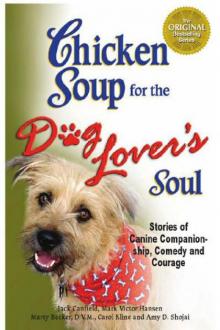 Chicken Soup for the Dog Lover's Soul
Chicken Soup for the Dog Lover's Soul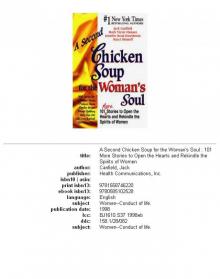 A Second Chicken Soup for the Woman's Soul
A Second Chicken Soup for the Woman's Soul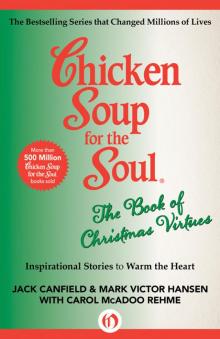 Chicken Soup for the Soul the Book of Christmas Virtues
Chicken Soup for the Soul the Book of Christmas Virtues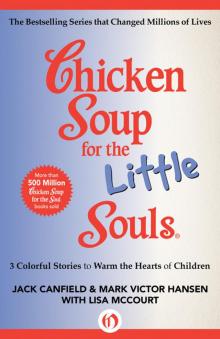 Chicken Soup for the Little Souls: 3 Colorful Stories to Warm the Hearts of Children
Chicken Soup for the Little Souls: 3 Colorful Stories to Warm the Hearts of Children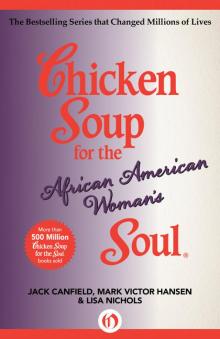 Chicken Soup for the African American Woman's Soul
Chicken Soup for the African American Woman's Soul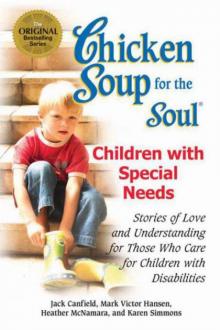 Chicken Soup for the Soul
Chicken Soup for the Soul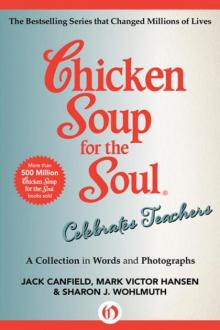 Chicken Soup for the Soul Celebrates Teachers
Chicken Soup for the Soul Celebrates Teachers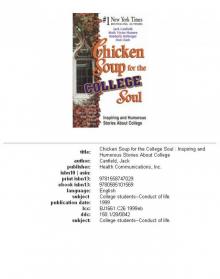 Chicken Soup for the College Soul
Chicken Soup for the College Soul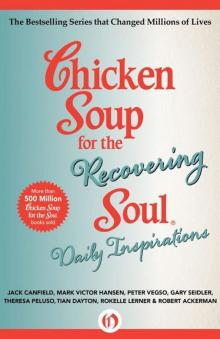 Chicken Soup for the Recovering Soul Daily Inspirations
Chicken Soup for the Recovering Soul Daily Inspirations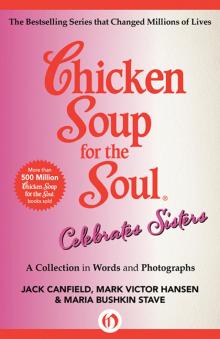 Chicken Soup for the Soul Celebrates Sisters
Chicken Soup for the Soul Celebrates Sisters Chicken Soup for the Dieter's Soul
Chicken Soup for the Dieter's Soul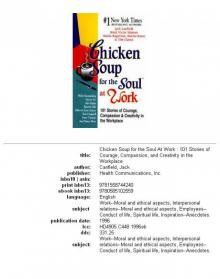 Chicken Soup for the Soul at Work 101 Stories of Courage
Chicken Soup for the Soul at Work 101 Stories of Courage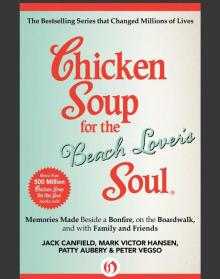 Chicken Soup for the Beach Lover's Soul
Chicken Soup for the Beach Lover's Soul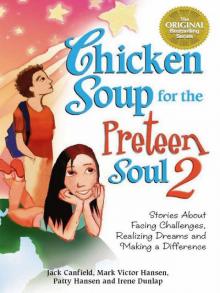 Stories About Facing Challenges, Realizing Dreams and Making a Difference
Stories About Facing Challenges, Realizing Dreams and Making a Difference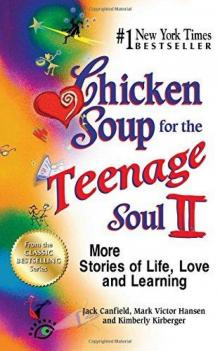 Chicken Soup for the Teenage Soul II
Chicken Soup for the Teenage Soul II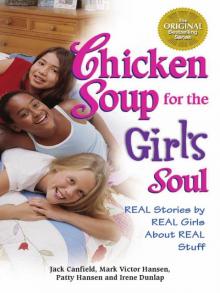 Chicken Soup for the Girl's Soul
Chicken Soup for the Girl's Soul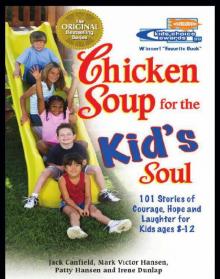 Chicken Soup for the Kid's Soul: 101 Stories of Courage, Hope and Laughter
Chicken Soup for the Kid's Soul: 101 Stories of Courage, Hope and Laughter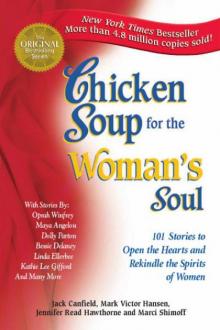 Chicken Soup for the Woman's Soul
Chicken Soup for the Woman's Soul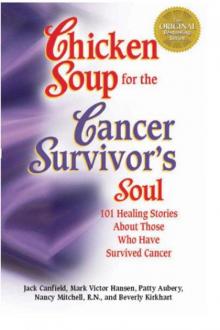 Chicken Soup for the Cancer Survivor's Soul
Chicken Soup for the Cancer Survivor's Soul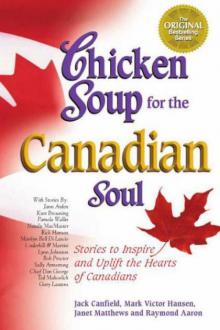 Chicken Soup for the Canadian Soul
Chicken Soup for the Canadian Soul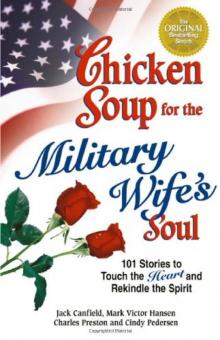 Chicken Soup for the Military Wife's Soul
Chicken Soup for the Military Wife's Soul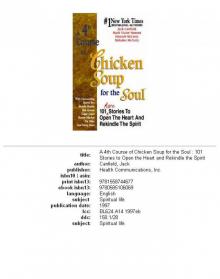 A 4th Course of Chicken Soup for the Soul
A 4th Course of Chicken Soup for the Soul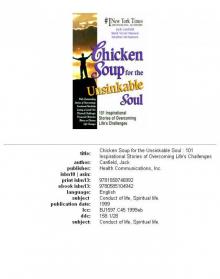 Chicken Soup Unsinkable Soul
Chicken Soup Unsinkable Soul Chicken Soup for the Soul: Christmas Magic
Chicken Soup for the Soul: Christmas Magic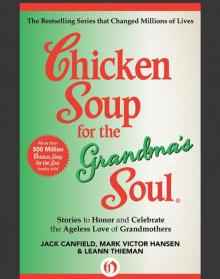 Chicken Soup for the Grandma's Soul
Chicken Soup for the Grandma's Soul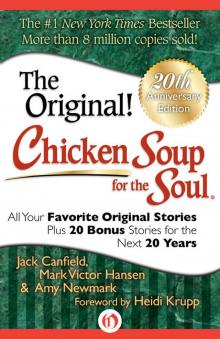 Chicken Soup for the Soul: All Your Favorite Original Stories
Chicken Soup for the Soul: All Your Favorite Original Stories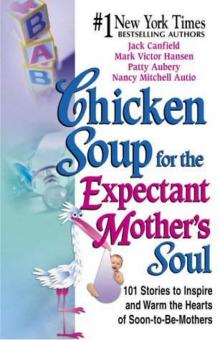 Chicken Soup for the Expectant Mother's Soul
Chicken Soup for the Expectant Mother's Soul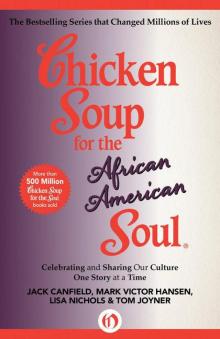 Chicken Soup for the African American Soul
Chicken Soup for the African American Soul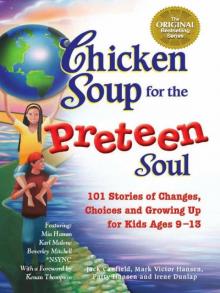 101 Stories of Changes, Choices and Growing Up for Kids Ages 9-13
101 Stories of Changes, Choices and Growing Up for Kids Ages 9-13 Christmas Magic
Christmas Magic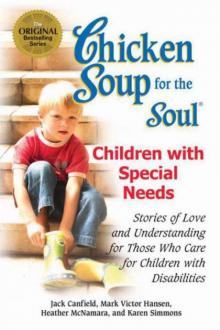 Chicken Soup for the Soul: Children with Special Needs
Chicken Soup for the Soul: Children with Special Needs Chicken Soup for the Soul: Country Music: The Inspirational Stories behind 101 of Your Favorite Country Songs
Chicken Soup for the Soul: Country Music: The Inspirational Stories behind 101 of Your Favorite Country Songs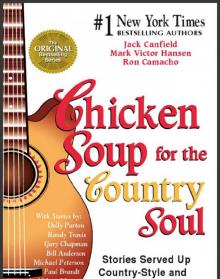 Chicken Soup for the Country Soul
Chicken Soup for the Country Soul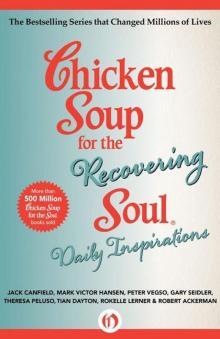 Chicken Soup for the Recovering Soul Daily Inspirations (Chicken Soup for the Soul)
Chicken Soup for the Recovering Soul Daily Inspirations (Chicken Soup for the Soul)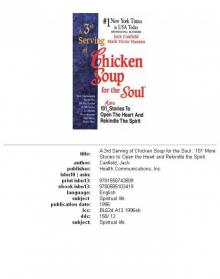 A 3rd Serving of Chicken Soup for the Soul
A 3rd Serving of Chicken Soup for the Soul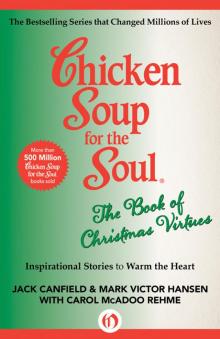 The Book of Christmas Virtues
The Book of Christmas Virtues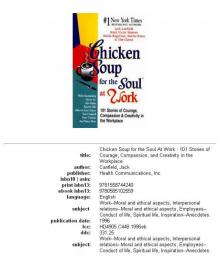 Chicken Soup for the Soul at Work
Chicken Soup for the Soul at Work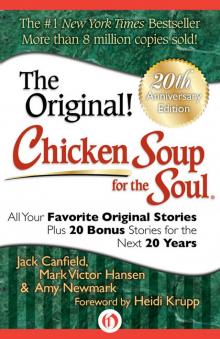 Chicken Soup for the Soul 20th Anniversary Edition
Chicken Soup for the Soul 20th Anniversary Edition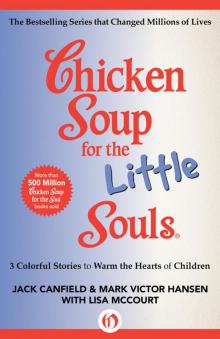 Chicken Soup for the Little Souls
Chicken Soup for the Little Souls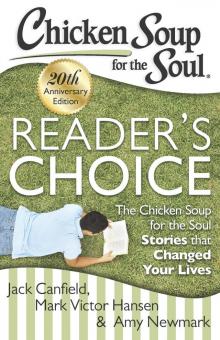 Chicken Soup for the Soul: Reader's Choice 20th Anniversary Edition
Chicken Soup for the Soul: Reader's Choice 20th Anniversary Edition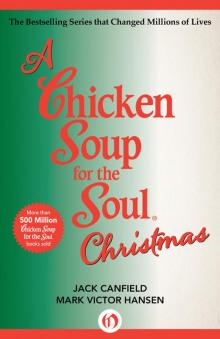 Chicken Soup for the Soul Christmas
Chicken Soup for the Soul Christmas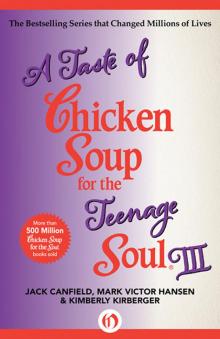 Taste of Chicken Soup for the Teenage Soul III
Taste of Chicken Soup for the Teenage Soul III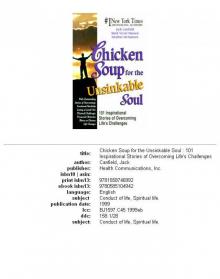 Chicken Soup for the Unsinkable Soul
Chicken Soup for the Unsinkable Soul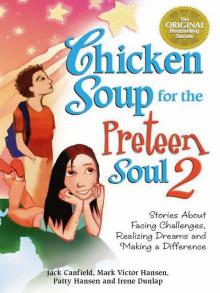 Chicken Soup for the Preteen Soul II
Chicken Soup for the Preteen Soul II